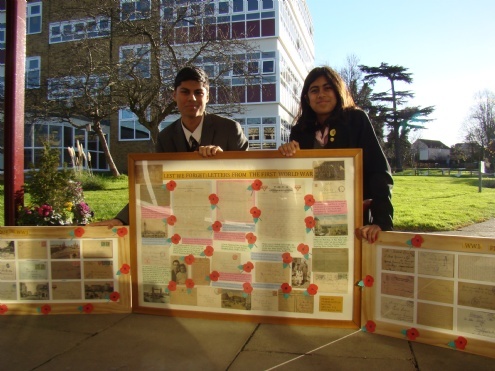West Hatch students bring alive the First World War through letters

A 14-year-old student at West Hatch High School, Chigwell, has recaptured the stories from the First World War through dozens of letters, postcards, prisoner of war posts and medals from 100 years ago.
A 14-year-old student at West Hatch High School, Chigwell, has recaptured the stories from the First World War through dozens of letters, postcards, prisoner of war posts and medals from 100 years ago.
Year 10 student Nilofer Sait, with the help of her brother, Adil (Year 13), has produced a poignant narrative through an exhibition on display at the school entitled ‘Lest We Forget: Letters from the First World War’.
Letters from teenaged soldiers from the war front which Nilofer chanced upon at stamp fairs inspired her to capture the voices of these young heroes.
Among the dozens of letters from the period displayed, she reproduces the correspondence of three ordinary soldiers, Private Butler, at Rugeley Base in Staffordshire; Sargeant Caston traveling with Salonica Forces in Greece; and Lance Corporal McPherson traveling with the 55th Battalion, MOG at an undisclosed front.
Their dispatches reflect the ordinary yet moving emotions, fears and hopes from missing loved ones, being inspected by Royalty, facing the scorching heat, marching dozens of miles every day, receiving handkerchiefs, cigarettes and photos, looking out for war memorabilia themselves and wanting the war to end.
Private Butler is only a teenager as he writes that all above 18 years and four months are being trained to “relieve fit men from the firing line” but notes in 1914 and hopes he will not be sent to the frontline without an Act of Parliament which prescribes the minimum age as 19.
He writes of a “dust up” at the camp leading to a new order and emphasises the discipline at his base.
“We have to be up to the mark or two hours extra drill after tea”.
A typical day involved marching 15 to 20 miles.
Caston writes on how the weather is very hot here, it burns our legs. We have to go as far for water many a time”.
McPherson writes to his family: “This is my fifth Christmas away from home, better luck next year”.
The letters are marked with appeals for War Bonds, censorship and distinctive military details.
While putting together the project, Nilofer also realised that the “great war for civilisation” was not only a British story but one that touched various parts of the world.
On one hand Nilofer presents the gallant British war medals and military decoratives. On the other she displays dozens of prisoner of war letters from the First World War, often listing prisoner numbers and hospitals.
As they are mostly in German language, they appear mute and dehumanising.
In another frame, letters and post cards are arrayed from a very different global scene a century ago of the Austo-Hungarian, Russian, Ottoman and Japanese Empires and from France, Italy, Switzerland and the United States of America.
Nilofer says her First World War project made her proud to be British but at the same time realise the sacrifices of earlier generations which give us the freedoms of today.
However, the horrors of war and the human costs on all sides have motivated Nilofer to work for diplomacy and world peace.
Adil Sait begins university next year to study urban planning at University College London.
West Hatch High School headteacher Frances Howarth said: “It’s very moving to have two students who wanted to do something to mark the 100th anniversary of the outbreak of the First World War.
“Through their dedicated research they have been able to highlight the tremendous efforts and sacrifices made on behalf of all of us.”
PICTURE CAPTION
Nilofer and Adil Sait with their ‘Lest We Forget: Letters from the First World War’.
